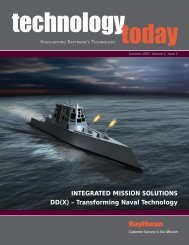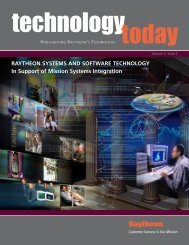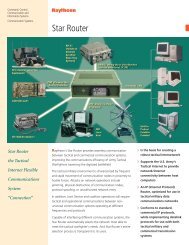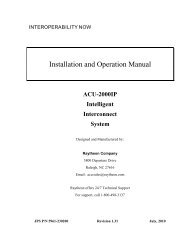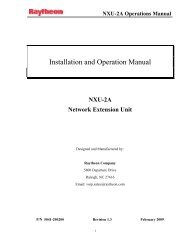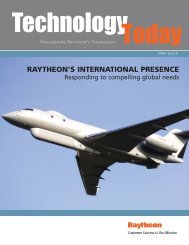Raytheon Company Public Key Infrastructure (PKI) Certificate Policy
Raytheon Company Public Key Infrastructure (PKI) Certificate Policy
Raytheon Company Public Key Infrastructure (PKI) Certificate Policy
You also want an ePaper? Increase the reach of your titles
YUMPU automatically turns print PDFs into web optimized ePapers that Google loves.
1 INTRODUCTION<br />
This <strong>Certificate</strong> <strong>Policy</strong> (CP) governs the operation of a <strong>Public</strong> <strong>Key</strong> <strong>Infrastructure</strong> (<strong>PKI</strong>) consisting<br />
of products and services that provide and manage X.509 certificates for public-key<br />
cryptography. <strong>Certificate</strong>s identify the individual named in the certificate, and bind that person<br />
to a particular public/private key pair.<br />
This CP defines several certificate policies that represent the test, low-software, low-hardware,<br />
medium-software, medium-CBP-software 1 , medium-hardware, medium-CBP-hardware, and<br />
high-hardware assurance levels for public key certificates. The word “assurance” used in this<br />
CP means how well a Relying Party can be certain of the identity binding between the public<br />
key and the individual whose subject name is cited in the certificate. In addition, it also reflects<br />
how well the Relying Party can be certain that the individual whose subject name is cited in the<br />
certificate is controlling the use of the private key that corresponds to the public key in the<br />
certificate, and how securely the system which was used to produce the certificate and (if<br />
appropriate) deliver the private key to the subscriber performs its task.<br />
<strong>Raytheon</strong> plans to operate a Certification Authority (CA) based on the policies in this CP to<br />
facilitate cross-certification with the CertiPath Bridge Certification Authority (CBCA) for<br />
interoperation among Aerospace <strong>PKI</strong>s.<br />
<strong>Raytheon</strong> programs require services such as authentication, confidentiality, technical nonrepudiation,<br />
and access control. These services are met with an array of network security<br />
devices such as users, workstations, firewalls, routers, network encryptors, and trusted<br />
database servers. The operation of these devices is supported and completed by use of publickey<br />
cryptography. As a system solution, the devices share the burden of the total system<br />
security. The use of public key certificates does not add any security services in a poorly<br />
designed or implemented system.<br />
Security management services provided by the <strong>PKI</strong> include:<br />
� <strong>Key</strong> Generation/Storage/Recovery<br />
� <strong>Certificate</strong> Generation, Update, Renewal, Re-key, and Distribution<br />
� <strong>Certificate</strong> Revocation List (CRL) Generation and Distribute<br />
� Directory Management of <strong>Certificate</strong> Related Items<br />
� <strong>Certificate</strong> Update, Renewal, Re-key, and Recovery<br />
� <strong>Certificate</strong> token initialization/programming/management<br />
� System Management functions (e.g. security audit, configuration management, archive,<br />
etc.)<br />
The security of these services is ensured by defining requirements on <strong>PKI</strong> activities, including<br />
the following:<br />
� Subscriber identification and authorization verification<br />
� Control of computer and cryptographic systems<br />
� Operation of computer and cryptographic systems<br />
� Usage of keys and public-key certificates by Subscribers and Relying Parties<br />
1 Note: CBP stands for Commercial Best Practices<br />
11 7/25/2011




